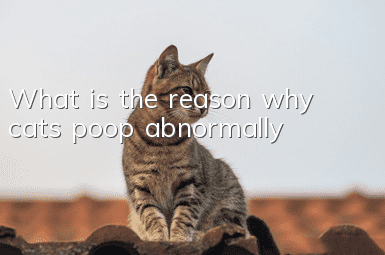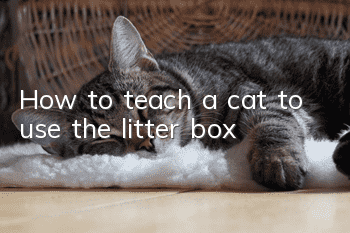What are the things that make cats with a glassy heart feel stressed?

The cat started pooping at the door?
Don’t pee in the cat litter box?
Attack other cats?
Do you have cat ringworm or other skin diseases?
Loose stool? Vomiting?
A series of the above-mentioned behaviors and health problems may be caused by stress.
As a qualified cat owner, we should be aware of all the stressors in our lives that may cause stress to cats, and try to eliminate them as much as possible.
▍What exactly is pressure
Stress is a word we often use in our daily lives. It usually refers to the feeling of being worried about something, and sometimes even feeling overwhelmed. We worry about our health, our loved ones, money problems, traffic jams...it really is a long list.
But what about our cats?
What makes cats stressed and how does this stress affect them?
Stress and change are closely related.
The goal of all living things is to achieve stable survival while meeting their needs.
This is the so-called steady state.
Pressures of all kinds, whether from the outside world or from our own bodies or minds, can interfere with this sense of balance and create stress.
The effects of stress can be physical or psychological. Change always threatens us in some way—even positive change. It triggers the body's fight-or-flight mechanism, causing the release of adrenaline hormones.
▍What causes stress
Sources of stress, or causes of stress, can be difficult to identify.
It is the perception of threat that causes stress, not the objective level of threat.
Therefore, something that may be stressful to one person or cat may not be stressful to another person or cat.
Some cats are more susceptible to stress and are more sensitive to environmental changes and disturbances. These cats tend to see potential threats anywhere.
Psychologists list potential causes of stress in humans. Generally speaking, two types of stressors are included in these lists:
Event - Either a positive event, such as an engagement and marriage, the birth of a child, or moving to a new home, or a negative event, such as a divorce, job loss, orThe death of a family member.
Chronic stress – something you have to deal with on a regular basis. Fucking boss, disobedient kids, noisy environment, etc.
▍The impact of stress
All living things are affected by stress, and cats are no exception. Consistently elevated stress levels can be harmful in the long term. In humans, they have been linked to depression, weak immune systems and even cancer.
Stress may have similar effects on cats. Reports show that stress can trigger or exacerbate conditions such as urinary tract disease, asthma, skin allergies, stomatitis, pancreatitis, inflammatory bowel disease, liver inflammation, and even FIP.
Behavioral problems are a common result of increased stress. They can be a quick response to acute stress or develop over time. In fact, any change in your cat's behavior, and any behavioral problems you notice, may stem from increased stress levels. That's why cat behaviorists have been studying stressors in cats.
▍Causes of stress in cats
Stress patterns can be complex.
For example, illness may be caused at least in part by elevated stress levels, but it may also be a source of stress in its own right.
When assessing a cat's condition, especially when dealing with behavioral issues, it is important to review the list of potential stressors and identify the source of the problem.
Only by resolving these pressures can we achieve a long-term solution to this problem
The following is a list of potential stressors in a cat’s life. Some of this is unavoidable. And some can be improved through active efforts.
Either way, you should be aware that they can cause stress for your cat.
Even if your cat is relatively "stress tolerant," stress can build up over time and eventually lead to behavioral and health problems.
Physical stressors:
Go to the vet or hospital
Body trauma
Disease
Parasite
Surgery
Remove debris
Taking new drugs (physiological effects)
Vision or hearing loss (sometimes gradual)
Deworming
Wearing a collar
Chronic or acute pain
Estrus
Pregnancy
Breastfeeding
Taking medicine (a very reluctant cat)
Take a bath
Shaving
Diet:
Changes in food types
Weight loss diet and food restriction
Malnutrition or unbalanced diet
Thirst or hunger
Cat litter box:
Not enough litter boxes (had to "wait").
Dirty cat litter box
Changes in cat litter types
Changes in cat litter box types
Changes in the location of the cat litter box
Environmental changes:
Moving to a new home
Renovate or renovate the house, change the decoration
4 types of loud noises: thunderstorms, fireworks, construction, and dog barking
Strong smell
Wear a collar
Adopted
Living in a shelter
Travel
Flying by plane
Lost
Changes in daily life
Seasonal and Daylight Saving Time Changes
Restricting entry to the house
Restricted to a certain room
Confined to a cat cage
Limited to vehicles
The house is too hot or too cold
Loud music or TV
Surprises and "traps"
Scary cat toys
Earthquake
Extreme weather conditions
Less exercise
Sudden increase in exercise volume
Boredom and lack of stimulation
Not enough space to climb
Harassment or aggression by dogs or other pets
A new pet in the family
Participate in cat shows
Related to people:
Newborn baby in the house
Death in the family
Guests in the house
A companion leaves or a new companion comes
The master starts a new job
The owner has a new spouse
Family members who leave the family (going to college, etc.)
Physical abuse of children or adults
Being scolded
Being punished in any form
Playing aggressive games with others
Human pressure
Any type of training (seat belt, toilet use, etc.)
People give excessive caress or attention
Related to other cats:
Introduce new cats (especially if the owner’s method is wrong)
Food competition – having to compete with other cats during meal times
Generalized competition with other cats in the same household
The sounds of fighting and howling
Harassment and aggression by another cat or cats, especially when using the litter box
Unknown cat appears near home
Smell another cat’s territorial urine marks
Accurate identification of stress sources will play a very important role in the treatment of some cat diseases. Therefore, for cats with glassy hearts, we should use more snacks.
- What to do if you are allergic to cats. Bathing your cat frequently can relieve the symptoms.
- What does it mean when a cat squints at people?
- What does the cat think when the scavenger touches the cat’s head?
- Can cats be dewormed after taking a bath?
- How to toilet train a 2-month-old kitten
- Clinical examination of cat heart disease, be wary of the invisible killer of cats!
- The cat is rolling on the ground and rubbing everywhere
- What will happen if a cat doesn’t bask in the sun?
- What should I do if my cat has a cold?
- What causes cat ears to bleed?



